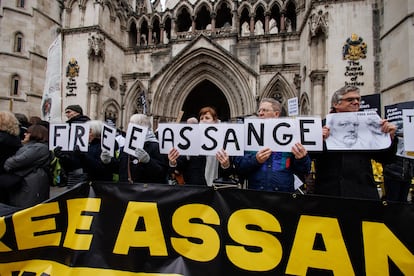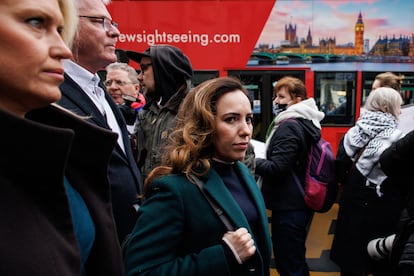Julian Assange’s defense denounces ‘politically motivated’ case in bid to stop extradition to the US
Hundreds of people gathered outside the High Court of Justice in London to demand the release of the WikiLeaks editor and support freedom of the press

The surroundings of the imposing neo-Gothic building that houses the Royal Courts of Justice in London are a regular scene of protests. The demonstration on Tuesday, however, exceeded expectations. “The world is watching,” Stella Assange, the wife of WikiLeaks co-founder Julian Assange told hundreds of people gathered there. It is the legendary phrase chanted in 1968 by demonstrators protesting in Chicago against the Vietnam War. It was also meant as encouragement for the dozens of people who came to express their solidarity with Assange, like the Colombian citizen Daniela, who arrived first thing in the morning and kept holding up one of the now famous posters with the face of Assange, his mouth gagged by the American flag.

Daniela was one of the first protesters to show up outside the court, but it didn’t take long for the street to get filled with activists. The international campaign organized to prevent the extradition to the United States of the person who today represents more than anyone else the need to defend freedom of the press also attracted relevant speakers committed to Assange’s cause.
Two judges, Victoria Sharp and Jeremy Johnson, will hear the arguments of Assange’s defense and the U.S. government throughout Tuesday and Wednesday. They must decide, in a preliminary hearing that has attracted immense global attention, whether to grant the founder of WikiLeaks one last chance to legally argue his case before British justice, or whether to give the final green light to his extradition to the United States, where he faces 17 charges of espionage and one charge of computer misuse. The Australian activist could receive up to 175 years in prison for leaking more than 250,000 classified documents from the U.S. State Department in November 2010. EL PAÍS was one of the media organizations that participated in the joint effort to publish those documents.
The idea that Julian could be accused of violating the U.S. Espionage Act, the same one that was applied to Daniel Ellsberg [the person responsible for leaking the Pentagon Papers, which revealed the lies about Vietnam] and others, is outrageous, said Jeremy Corbyn, the former leader of the British Labour Party, speaking on stage. “This court has the opportunity today to allow Assange to have his case heard, for justice to be done and for him to finally be a free man.”
Assange, who has been held at Belmarsh maximum security prison, on the outskirts of London, for five years, was not present on the first day of the trial. Nor did he connect via video conference, as on other occasions. His lawyer, Ed Fitzgerald, explained that he is not in good health. Judge Sharp wanted to make it clear, at the beginning of the hearing, that no obstacle had been placed on the possibility of Assange participating remotely.
Assange’s defense was the first to present its arguments before the judges. From the beginning they have denounced what they see as the political nature behind the entire legal process. “The accusation is politically motivated. Mr. Assange exposed serious criminal acts to the public, and has been persecuted for carrying out a common journalistic practice: obtaining and publishing classified information that was truthful and of public interest,” said Fitzgerald. “It is an abuse of the judicial process to demand extradition for a political offense.”
In defense of press freedom
Assange’s cause has become a worldwide cause for press freedom. The pressure of the campaign in favor of his release is not so much directed at the judges but at the American and British governments, which have it in their power to stop the procedures against Assange.
“This never should have been a matter resolved in court. And you don’t have to continue down that path. Let’s continue asking the United States to release Assange,” Rebecca Vincent, head of the campaign for his release on behalf of the organization Reporters Without Borders, told protesters.
The publication of the WikiLeaks classified documents in 2010 generated journalism in defense of the public interest throughout the world, said Vincent. “We know that he exposed war crimes and human rights violations. And only the man who allowed all of this to be published has been prosecuted. If he is extradited, the chilling impact will be enormous. It will impact media around the world and it will impact all of our right to know,” Vincent warned.
"If he is extradited, the chilling impact will be enormous. It will impact media around the world and it will impact all of our right to know"@Rebecca_Vincent#FreeAssangeNOW pic.twitter.com/KyJpucGdPY
— Free Assange - #FreeAssange (@FreeAssangeNews) February 20, 2024
The decision to allow Assange’s extradition was made in 2022 by the then home secretary Priti Patel, after the Supreme Court approved the guarantees offered by Washington on the prisoner’s safety, and on the measures that would be adopted to prevent him from ending his own life.
But the insistence on going after the WikiLeaks founder emerged from the Donald Trump administration. Former president Barack Obama had already commuted the sentence of the ex-soldier Chelsea Manning, the main source of the secret security documents published by the website, which brought to light serious episodes of dirty war waged in Iraq and Afghanistan.
“All those who committed those war crimes have been freed, and have even benefited financially from those crimes. And Julian, who threw truth in the face of power, must face trial. The British system, the British government, the American government, and an entire deeply corrupt system should be judged,” said Andrew Feinstein, former deputy of the South African National Congress, Nelson Mandela’s party. He was one of the people who came from all over the world to protest before the London court.
The two judges could announce their decision at the end of Wednesday’s session, although it will take them several days to publish their reasoning. If they rule in favor of the prisoner, it will allow the British justice system to debate once again the legality of the extradition. One last option, if the attempt to appeal against the extradition decision fails, is to go to the European Court of Human Rights (ECHR) in Strasbourg. But even if they obtained a rule 39 order to stop extradition from this court, it remains to be seen what the reaction of Rishi Sunak’s government would be. It is precisely these ECHR orders that paralyzed London’s attempts to deport irregular migrants to Rwanda. Downing Street and the hardline Conservative Party have since worked together to ignore these requirements, even if it means disobeying international law.
Sign up for our weekly newsletter to get more English-language news coverage from EL PAÍS USA Edition
Tu suscripción se está usando en otro dispositivo
¿Quieres añadir otro usuario a tu suscripción?
Si continúas leyendo en este dispositivo, no se podrá leer en el otro.
FlechaTu suscripción se está usando en otro dispositivo y solo puedes acceder a EL PAÍS desde un dispositivo a la vez.
Si quieres compartir tu cuenta, cambia tu suscripción a la modalidad Premium, así podrás añadir otro usuario. Cada uno accederá con su propia cuenta de email, lo que os permitirá personalizar vuestra experiencia en EL PAÍS.
¿Tienes una suscripción de empresa? Accede aquí para contratar más cuentas.
En el caso de no saber quién está usando tu cuenta, te recomendamos cambiar tu contraseña aquí.
Si decides continuar compartiendo tu cuenta, este mensaje se mostrará en tu dispositivo y en el de la otra persona que está usando tu cuenta de forma indefinida, afectando a tu experiencia de lectura. Puedes consultar aquí los términos y condiciones de la suscripción digital.









































